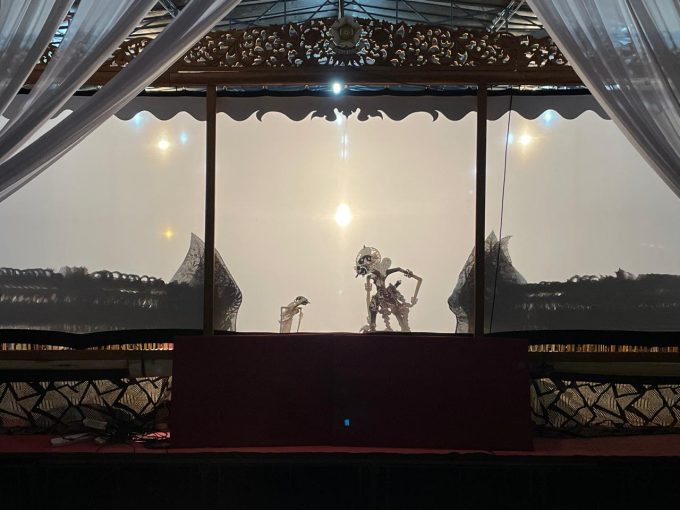
The traditional wayang kulit (shadow puppet) performance has been an inseparable part of the annual Dies Natalis celebrations at the Faculty of Philosophy, Universitas Gadjah Mada. However, this year’s performance, held on Monday night (August 19), brought something new. The puppeteer selected to perform was a UGM student, Ki M. Rafì Nur Fauzy. The gamelan musicians and the sinden (traditional female singer) who accompanied the performance were also students, members of the UGM Surakarta Style Javanese Arts Unit (UKJGS).
According to the Dean of the Faculty of Philosophy, Dr. Rr. Siti Murtiningsih, S.S., M.Hum., it is inspiring to see students dedicated to traditional arts, and such enthusiasm should be given ample space to grow. “This is proof that our younger generation still has a great love for traditional culture. We are all proud to witness our collective enthusiasm in preserving and celebrating the richness of our nation’s culture,” she said.
This year’s wayang performance featured the story of Gajah Mada titled “Gajah Mada Suci.” It was part of the Pentas Tradisi (Traditional Performance) during the 57th anniversary celebrations of the Faculty of Philosophy. The Pentas Tradisi also included performances such as the Lengger Dance from Wonosobo by UKJGS, performances from the Karafi and Philoswara gamelan groups, and a student hadrah (religious music) performance.
Dr. Murtiningsih explained that as part of an institution that upholds cultural values, the Faculty of Philosophy feels a strong responsibility to continue supporting and reviving the noble traditions that are part of Indonesia’s identity.
The Lengger Dance from Wonosobo, a cultural heritage from Central Java, not only showcased beautiful movements but also conveyed profound moral messages. The Karafi gamelan performance invited the audience to immerse themselves in the richness of traditional music with soul-soothing melodies. Hadrah brought a religious atmosphere filled with meaning, while the wayang performance reminded the audience of epic stories laden with life values.
“These performances demonstrate the importance of continuing to revive our traditions, not just as a heritage but as a source of inspiration and strength in facing the challenges of the times,” she said.
Traditional culture is often sidelined by the forces of modernization. However, we believe that by preserving and nurturing our traditions, we can find a balance between progress and cultural identity.
“We hope that through this performance, we can reflect on the noble values taught by our ancestors and how we can apply them in our daily lives. Let us make tradition a strong pillar in building a better future, not just for ourselves but for generations to come,” she concluded.
